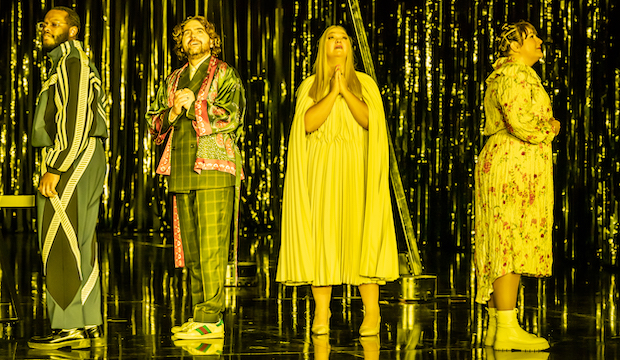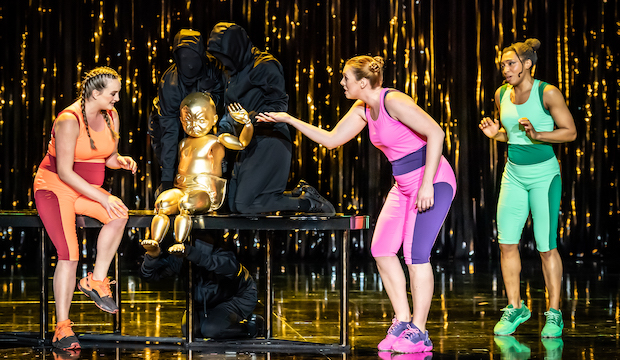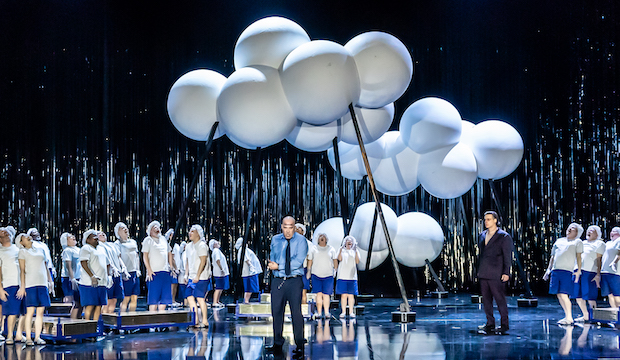The Rhinegold, English National Opera review ★★★★★
A razzle-dazzle production of Wagner's opera shows the company at its best, musically and dramatically
John Relyea as Wotan in ENO's Rhinegold. Photo: Marc Brenner
The last time I saw ENO perform Rheingold was in August 1978 when a university friend and I made a pilgrimage from Belfast for a cultural fix in London. ENO was then a thriving company which filled the London Coliseum, London’s largest theatre, six nights a week for nine months of the year. Among its treasures was a legendary production of Wagner’s Ring, the four operas which make up the greatest challenge for any opera company.
We would queue up every morning at 10am to buy day tickets for that evening’s performance (£1.80 for a seat in the balcony) and, in my memory, we saw the complete cycle during the course of a single week (plus going to see Verdi's tragic La Traviata on the Friday night for ‘light’ relief).
Rheingold, the first opera in the cycle, introduces us to a mythical world of Gods, water-spirits, magic shape-shifting helmets, Giants and the Nibelungs, a race that lives in a subterranean world of darkness.

ENO strikes gold in the second of its Wagner operas in the new Ring cycle. Photo: Marc Brenner
Alberich, Nibelung-in-Chief, steals gold from the Rhinemaidens and uses it to forge a ring that gives absolute power to its owner. When Wotan, chief of the Gods, steals the ring, Alberich places a curse on the ring: it will only bring death and destruction to its owner.
Wagner’s purpose-built theatre in Bayreuth has a pit which completely conceals the orchestra so that the orchestral sound wells up out of total darkness. The ENO orchestra gamely plays the opening of the opera with the pit lights turned off to achieve a similar effect. The percussion are placed in a stage box on one side of the stage which made for thrilling (but deafening) climaxes at orchestral high points but the conductor, ENO’s music director Martyn Brabbins ensures that the cast are never overwhelmed and John Deathridge’s wonderfully singable new English translation could be clearly heard on first night.
Brabbins’s interpretation and energising tempi suit the rather show-bizzy production by Richard Jones which goes for jokey entertainment rather than profundity.

The protective Rhinemaidens: Eleanor Dennis, Katie Stevenson and Idunnu Münch. Photo: Marc Brenner
There are two outstanding performances from a strong cast. Leigh Melrose plays Alberich in the first scene as a sleazy incel, wearing a (deliberately) hideous wig which guarantees the failure of his amorous advances towards the Rhinemaidens. Later, having renounced love in order to gain limitless power, he appears as a shaven-headed thug who terrifies his enslaved workforce and, in an intensely physical performance, uses his powerful baritone to portray a terrifying – and terrifyingly stupid – Alberich.
Tenor Frederick Ballentine gives a wonderfully vivid portrayal of Loge, the God of Fire, played as a street-wise effete with sociopathic tendencies and lime-green gloves. And a special mention for another tenor, John Findon, a member of the ENO Harewood Artist programme, whose brief appearances as Mime suggests a thrillingly powerful voice.

Designer Stewart Laing and director Richard Jones opt for a show-fizzy production. Photo: Marc Brenner
The director and designer keep their most powerful effects for the end. The Rainbow Bridge which leads the Gods into Valhalla is an enormous confetti shower, forming columns of the colours of the rainbow, a dazzling effect which would have been at home in Las Vegas. And in the closing bars, the Gods lock themselves into a Valhalla that was more like the inside of a Panic Room, while the Rheinmaidens hammer on the windows like a disaffected populace demanding the return of their gold.
ENO is a company currently facing its own destruction. Arts Council England announced in November, in a politically driven decision, that it is axing ENO’s funding from April unless it moves outside London. ENO is quite rightly fighting back and last month the Arts Council announced that ENO will receive one more year of funding.
This is a shameful way to treat a company with a proud history of bringing opera to the people of London and beyond since 1931. Productions like this Rhinegold show that company at its best.
The Rhinegold is sung in English, with English surtitles. Further performances are on 21, 23, 26 Feb; I, 4, 8, 10 March
We would queue up every morning at 10am to buy day tickets for that evening’s performance (£1.80 for a seat in the balcony) and, in my memory, we saw the complete cycle during the course of a single week (plus going to see Verdi's tragic La Traviata on the Friday night for ‘light’ relief).
Rheingold, the first opera in the cycle, introduces us to a mythical world of Gods, water-spirits, magic shape-shifting helmets, Giants and the Nibelungs, a race that lives in a subterranean world of darkness.

ENO strikes gold in the second of its Wagner operas in the new Ring cycle. Photo: Marc Brenner
Alberich, Nibelung-in-Chief, steals gold from the Rhinemaidens and uses it to forge a ring that gives absolute power to its owner. When Wotan, chief of the Gods, steals the ring, Alberich places a curse on the ring: it will only bring death and destruction to its owner.
Wagner’s purpose-built theatre in Bayreuth has a pit which completely conceals the orchestra so that the orchestral sound wells up out of total darkness. The ENO orchestra gamely plays the opening of the opera with the pit lights turned off to achieve a similar effect. The percussion are placed in a stage box on one side of the stage which made for thrilling (but deafening) climaxes at orchestral high points but the conductor, ENO’s music director Martyn Brabbins ensures that the cast are never overwhelmed and John Deathridge’s wonderfully singable new English translation could be clearly heard on first night.
Brabbins’s interpretation and energising tempi suit the rather show-bizzy production by Richard Jones which goes for jokey entertainment rather than profundity.

The protective Rhinemaidens: Eleanor Dennis, Katie Stevenson and Idunnu Münch. Photo: Marc Brenner
There are two outstanding performances from a strong cast. Leigh Melrose plays Alberich in the first scene as a sleazy incel, wearing a (deliberately) hideous wig which guarantees the failure of his amorous advances towards the Rhinemaidens. Later, having renounced love in order to gain limitless power, he appears as a shaven-headed thug who terrifies his enslaved workforce and, in an intensely physical performance, uses his powerful baritone to portray a terrifying – and terrifyingly stupid – Alberich.
Tenor Frederick Ballentine gives a wonderfully vivid portrayal of Loge, the God of Fire, played as a street-wise effete with sociopathic tendencies and lime-green gloves. And a special mention for another tenor, John Findon, a member of the ENO Harewood Artist programme, whose brief appearances as Mime suggests a thrillingly powerful voice.

Designer Stewart Laing and director Richard Jones opt for a show-fizzy production. Photo: Marc Brenner
The director and designer keep their most powerful effects for the end. The Rainbow Bridge which leads the Gods into Valhalla is an enormous confetti shower, forming columns of the colours of the rainbow, a dazzling effect which would have been at home in Las Vegas. And in the closing bars, the Gods lock themselves into a Valhalla that was more like the inside of a Panic Room, while the Rheinmaidens hammer on the windows like a disaffected populace demanding the return of their gold.
ENO is a company currently facing its own destruction. Arts Council England announced in November, in a politically driven decision, that it is axing ENO’s funding from April unless it moves outside London. ENO is quite rightly fighting back and last month the Arts Council announced that ENO will receive one more year of funding.
This is a shameful way to treat a company with a proud history of bringing opera to the people of London and beyond since 1931. Productions like this Rhinegold show that company at its best.
The Rhinegold is sung in English, with English surtitles. Further performances are on 21, 23, 26 Feb; I, 4, 8, 10 March
TRY CULTURE WHISPER
Receive free tickets & insider tips to unlock the best of London — direct to your inbox
| What | The Rhinegold, English National Opera review |
| Where | English National Opera, London Coliseum, St Martin's Lane, London, WC2N 4ES | MAP |
| Nearest tube | Embankment (underground) |
| When |
18 Feb 23 – 10 Mar 23, Eight performances, start times vary. Running time 2hr 45min with no interval |
| Price | £35-£180 |
| Website | Click here for details and booking |